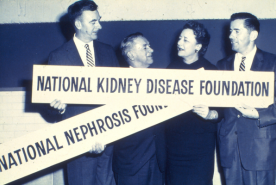Seven tips to support kids' kidney health: exercise, reduce sugar and salt, serve water, maintain weight, use meds properly, and get regular checkups.
Kidney disease is common among adults, and many habits learned by kids can set the stage for kidney health as they get older. You can help your kid(s) protect their kidneys from an early age. Here are seven golden rules to start following now to ensure your child’s future kidney health.
- Get regular exercise/activity/play: Regular exercise and physical activity can help your kid feel better, and improve and maintain their health. Physical activity helps keep many parts of your kid’s body healthy, including their bones, muscles, heart, and kidneys. There are many ways to incorporate more physical activity into your kid’s schedule, such as walking the dog together and walking more instead of being in the car. It is also important to find out what activities they like, so they are more likely to stay with certain activities. The key is to keep it fun. You may need to try new things if their preferences change as they get older. It is also important to limit media time for your kid. Media time can include television, smartphones, tablets, and computers.
- Reduce sugar: Too much sugar can raise the risk of diabetes as kids get older. High blood sugar can also put a strain on their kidneys. Diabetes is the leading cause of kidney failure in adults. You can lower your kid’s sugar intake by cutting back on sugary drinks, such as sodas, juices and sports drinks. Sugary snacks and cereals should also be avoided as much as possible. Many other foods can also contain added sugar, such as bread and tomato sauce, so be sure to check the labels for sugar content.
- Serve water: Serving water instead of sugary drinks is a good way to cut down on sugar. Water is important for good kidney health and helps the kidneys remove wastes from the blood in the form of urine. Water also helps the blood travel freely through the kidneys and the rest of the body. Making sure kids drink enough water is important, especially when they are active when the weather is warm and humid. Having enough water to prevent dehydration is important, especially for kids. Mild dehydration can make kids feel tired. More severe dehydration can impair normal bodily functions, and very severe dehydration can lead to kidney damage. When a kid has enough water, their urine flows freely and is lighter in color. When a kid does not have enough water, the urine is usually darker in color and has a stronger odor.
- Reduce salt: Sodium is needed for the body to function, but too much sodium can be harmful. Sodium can make the body hold on to more water. This extra stored water can raise blood pressure and strain different parts of the body, including blood vessels and kidneys. High blood pressure can damage kidneys as kids get older. High blood pressure is the second leading cause of kidney failure in adults. High blood pressure also increases the risk for heart disease and stroke. Table salt and salty snacks should be cut back. Processed foods and fast food also have high amounts of sodium and should also be limited.
- Maintain a healthy weight: Everyone needs some body fat for energy, heat insulation, and other body functions. This is especially true for kids. However, too much fat and calories can lead to weight gain. Having too much body fat and weight can lead to serious health problems. The more excess body fat a kid has, as they get older, the greater their risk for diabetes, kidney disease, heart disease, and other problems. Some studies have shown that childhood obesity is associated with a higher risk of kidney disease over time. Maintaining a healthy weight can help prevent or control many health problems, including diabetes and high blood pressure. You should speak to a healthcare provider about your kid’s proper weight range. If necessary, also discuss necessary age-appropriate weight-loss steps for your kid, and any health considerations before beginning any new diet, exercise, or activity. Reinforce a healthy diet and good nutrition. Prepare meals that are the appropriate portion size. Finally, one of the most important influences of a kid’s behavior is the lifestyle choices that parents make. Kids can learn habits that last them a lifetime, and many of these habits can play a large role in determining their risk for kidney disease. Teaching your kid how to eat better and get more physical activity, while they are young, will help them live a healthier lifestyle throughout their life, and help protect their kidney health.
- Use medications properly: If your kid needs to take certain medications, it is important to stick to their medication schedule. Also, overuse of certain pain medicines can be harmful to the kidneys. It is important to speak to your child’s healthcare provider before using any medicine for your child. Read medication labels, and make sure they do not take more than the amount stated on the label, or more than their healthcare provider recommends. Avoid prolonged use (longer than stated on the label or recommended by a healthcare provider). Drinking enough water with medication is also important.
- Get regular checkups: Make sure you get regular checkups for your kid. Your kid’s healthcare provider will check their overall health and look for any possible problems. Let you kid’s healthcare provider know if they are experiencing any unusual symptoms, such as feeling tired, difficulty sleeping, trouble concentrating, poor appetite, issues with urinating, swollen feet and ankles, and/or puffiness around their eyes. To diagnose kidney disease, a healthcare provider will conduct a physical exam, check for signs and symptoms, and review their medical history. Urine and blood tests can be used to check how well their kidneys are working. If necessary, imaging studies can also help confirm a diagnosis.








